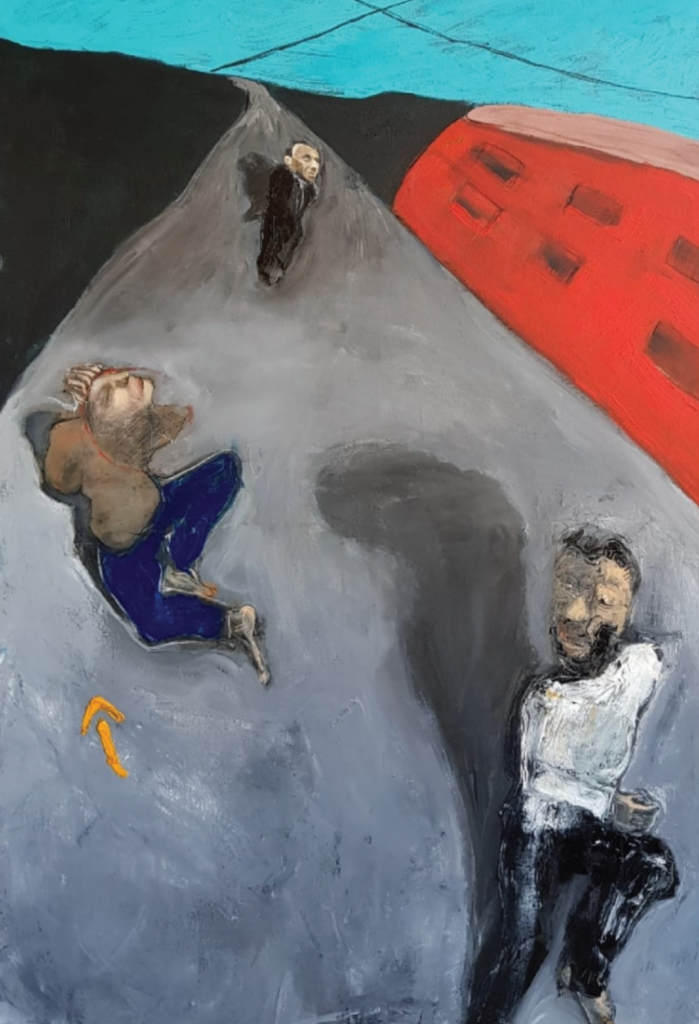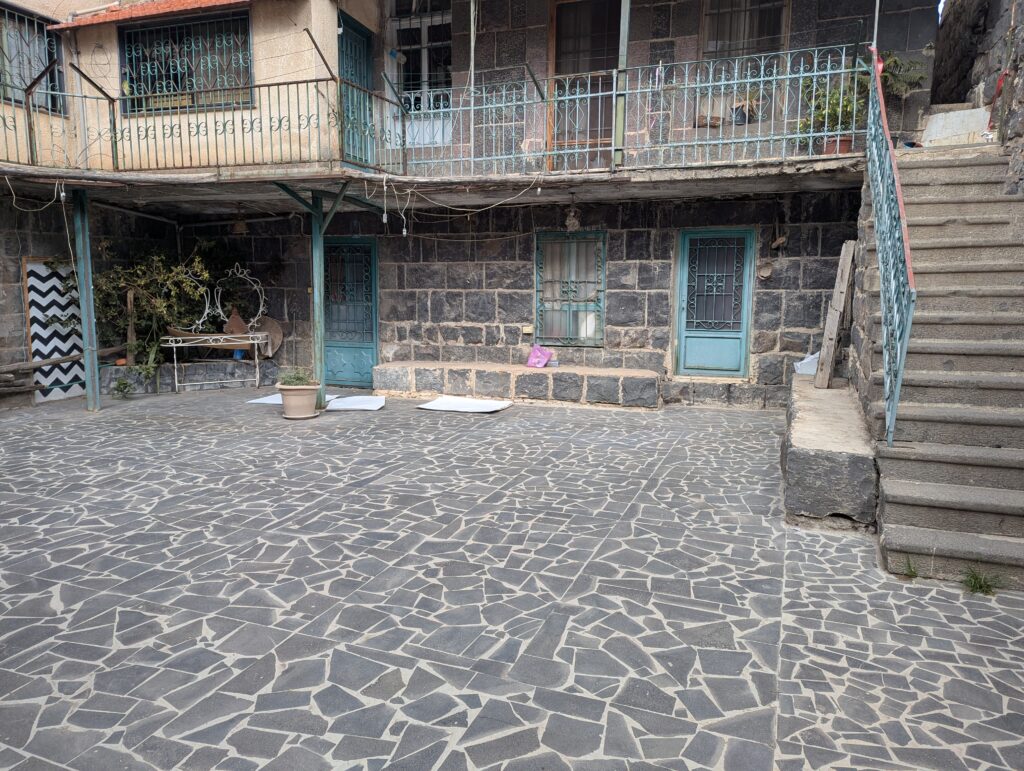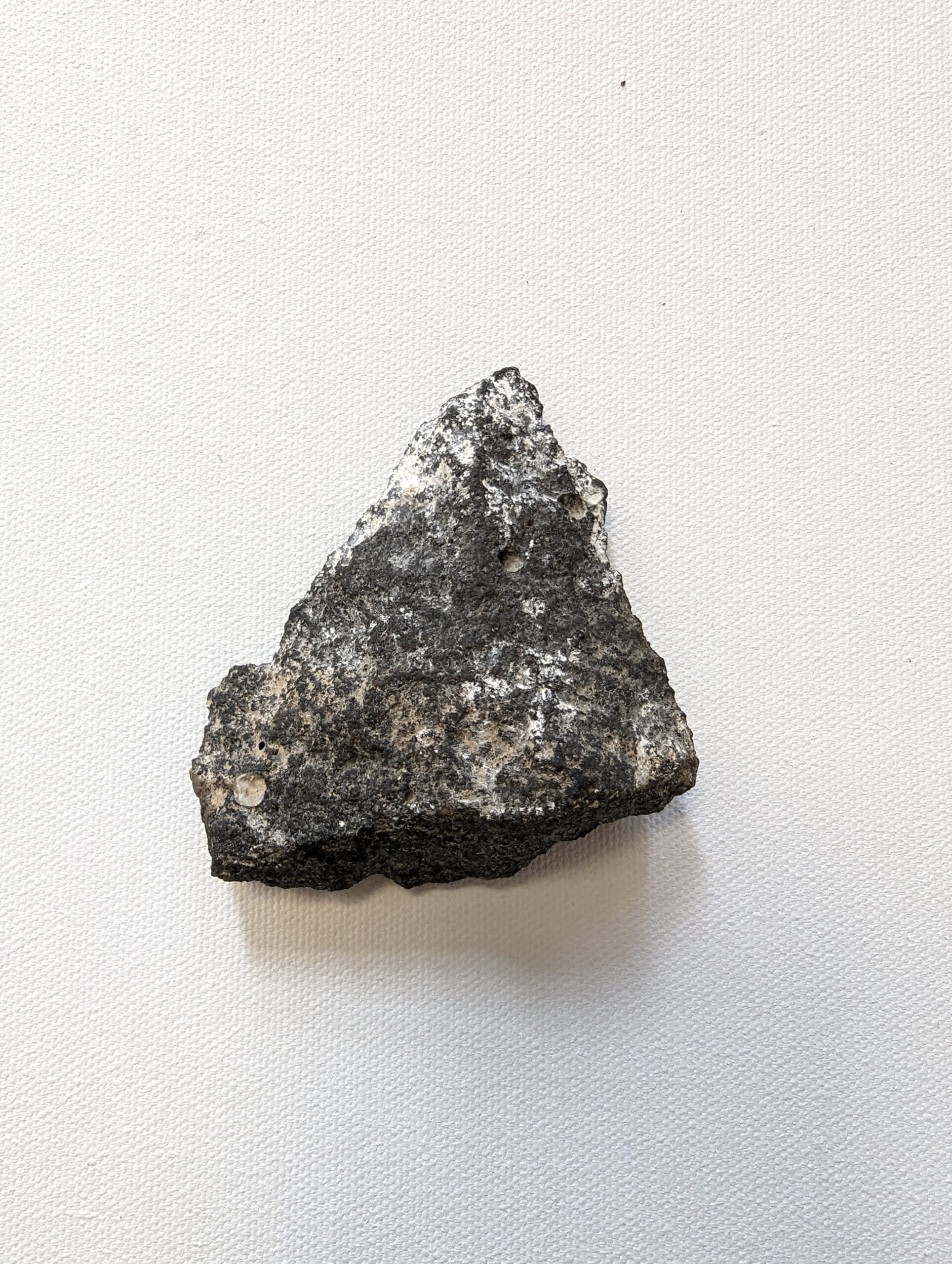News
This article was originally written in Arabic for ICON MENA’s Issue 05, themed ‘Blank Canvas’ and has been translated into English.
![]()
I returned to Syria after five years in exile, following Assad’s fall. Stepping into my studio, I found the faint trace of my last painting still on the wall, just as I had left it in my hurried departure. In that moment, the phrase everything and nothing changes was balancing the acids in my stomach.
The Painting
Since leaving Syria for Beirut in 2016 to pursue my college studies, I found myself cornered by memories of war, memories I needed to expand and confront. That was when I began working on The Fifth of December, inspired by Goya’s The Third of May, which captured the horrors of Napoleon’s war on Spain and the stark dichotomy between victim and executioner. From this point, I traced a timeline back to the Syrian revolution of 2011, piecing together my own history, starting with the protest I took part in and the funeral of a friend, Salah, who was assassinated by the Assad regime. I attended the funeral with my mother. The regime refused to return Salah’s body to his family, in an attempt to bar the funeral. The family held the funeral anyway. We left Salah’s house carrying roses and a large photograph of him, but the scene soon turned into chaos.
Amid the chaos of gunfire and tear gas unleashed by security forces, I was separated from my mother. I ran, fleeing for my life as bullets and officers ran after me. Hours passed before I found her again. In that moment, I was both the victim and executioner; a victim of the brutal reality around me, yet an executioner of myself for leaving my mother behind. But the toughest part was the sense of separation: from the place, the group, and most painfully, from her.
Over and over, I questioned myself: Did I run away and leave her? Should I have done something else?

The Stones
I didn’t fully grasp the depth of my exile in London until I found myself listening to Fairuz almost daily. Only then did I realise that I was overcome with longing after five years since my last visit to Syria and a decade since leaving it, floating in a sky whose land never anchored me.
My relationship with Fairuz felt like a surrender, to her and to the conflicts she represents, especially after years of resisting both her and the state of rumination tied to her songs while living in Beirut. But after leaving for London, I fell into her trap, one that swallowed me whole, along with my irony and my fate. Her songs became liquid, flowing through the channels of my eyes and nose, seen and heard by fellow passengers on London’s public transport as I wept, unashamed, to the sound of her in my headphones.
Surrendering to Fairuz unearthed emotions and needs I hadn’t fully acknowledged. The attachment was no longer limited to dwelling on melancholic melodies, lost love, and the ache of separation. It became a need to embody these emotions, to free them from their inner confines and release them into an external world, one that could be seen, touched, and, perhaps, no longer endured in solitude. I didn’t have to think long about how to do this, for almost instantly, a stone from our house in Syria took shape in my mind, clear and tangible enough for me to long to bring it to London.
My relationship with our house back home is deeply complex, as it is with objects of sentimental value. Ever since I was banned from returning to my childhood home in Syria, and later lost the first home I chose for myself in Lebanon in the Beirut port blast, I have found myself floundering whenever the notion of home arises. I became like a tortoise, carrying my house on my back wherever I went.

Extracting The Stone
I asked my cousin back home to extract a stone from our house, hoping it could be brought to London by a friend who was visiting Syria at the time. The process turned out to be far more complicated than I had imagined. The three-storey house, once full of life, now stood nearly abandoned. Its owners are scattered by time and circumstance. My grandparents had passed away, my uncle had immigrated to the United States, and my parents were constantly travelling to visit my siblings.
The first step in retrieving the stone was securing permission to enter. With no one inside, my cousin Hashem, tasked with the mission, had to explain himself to our neighbour, who owned the shop next door. At the very least, he had to justify why he was climbing over the gate with a bag in hand. The stones of our house are compact, black, and basalt. Extracting one of them is no easy task. The fence, stairs, outer wall, and courtyard all appear as one solid black block, permeated by white cement that further compacts the stones. My father suggested we ask a family member for help, fearing that the basalt shrapnel might injure anyone attempting to separate the stones. In the end, Hashem managed to extract not one, but three stones; two small ones and one large one, and sent them to me with a friend. The stones arrived in London wrapped in a red plastic bag. At the time, my brother, Amr, was visiting me. Amr, who had been unable to return to Syria for 13 years after being forced to leave due to his activism.

When I received the bag, I felt a mix of nervousness and shame about my obsession with this stone. My brother had left home long before I did, as had many of our friends sitting in that same room. They seemed to have handled their exile better, or at least, that’s what they showed. And perhaps that was precisely why I chose to open the bag in front of them, hoping it would free me from this fixation. But the moment I did, it felt as though the stone had settled deep in my stomach. Caught between feeling moved and embarrassed, I instinctively handed one of the three stones to those around me, as if enacting a ritual that meant nothing for anyone but me. In truth, my reaction was far less emotional than I had anticipated, especially after seeing the indifferent responses of others. It wasn’t exactly disappointing, but it left me with a sense of shame and vulnerability as if I needed to gather my stones and safeguard my ritual, keeping it to myself rather than sharing it with those who didn’t understand.
As for my brother, he was deliberately indifferent. It seemed to me that this stone was smashing the carefully constructed defences he had built to ward off the ‘threat’ of nostalgia. As if it were chipping away at the glass shield that protected him from feeling the weight of loss. Or maybe that’s just what I wanted to believe because the only thing harder than losing a home is losing the longing for it. I gathered my stones, placed them back in the red plastic bag, and then into my own bag. And from that moment on, one of the three stones accompanied me every day, adding to the weight I carried as I wandered through the streets of London.
I kept shifting the symbolism of this stone; at times sketching it, at others placing it on a shelf, treating it like a decorative object, and sometimes even seeing it as a source of protection, like a weapon. But then, I began to feel its weight. I carried it in the front pocket of my bag everywhere I went, but soon, it started scratching my glasses as it rubbed against them and my other belongings. The scratches distorted my vision, another layer of symbolism I couldn’t ignore. Eventually, I felt as if this new presence required more care than the casual chaos I allowed inside my bag. The rock, in its own way, was demanding order from me.
Why Did I Leave The Stone Alone?
Khaldoun, whom I love, welcomed me and my stones into his warm home, a refuge amid London’s cold, for a long time. That is until I once again felt the weight creeping in, the need to drift after tasting a little comfort. I found myself moving into a room at another friend’s place. The act of separation, whether changing houses or separating the past, had become so familiar that I didn’t struggle to follow through, despite the deep entanglement of emotions between Khaldoun, his home, and me.
On his birthday, I decided to gift him one of the three stones as a gesture of gratitude for his hospitality, and for his home. I hesitated before taking this step, especially since the stone would find itself among an overwhelming number of other gifts I got him. A friend once told me that she takes the initiative in hugging people first, adjusting the intensity of the embrace out of fear that someone might hug her and then pull away, leaving her with a strange sense of separation in her body. Perhaps it was this very fear of separation that pushed me to exaggerate the gesture of my gift, as if to guard against love retreating. I placed the rock inside a plant pot holding a jasmine. Khaldoun received the gifts with joy, yet his reaction seemed almost inadequate once his eyes fell on the rock.
A month later, Khaldoun received an eviction notice after his neighbour, Alice—the granddaughter of a former British foreign minister—decided to expand her home. She had deemed the lighting in Khaldoun’s apartment ideal for an additional kitchen, with its distinct view of the street and neighbourhood park. She spoke of “restoring the Victorian glory” of the house’s architecture in Bloomsbury, as if it were her personal inheritance to reclaim. Alice wielded her inherited authority to force Khaldoun out of his warm home, so she and her insufferable people could feast at their ever-expanding table. It was impossible to ignore the colonial undertones of her actions, especially since, after the genocidal war on Gaza, we had placed a Palestinian flag on the window overlooking the street, alongside BDS stickers that were repeatedly torn down. This only deepened our suspicion that the eviction was tied to our support for Palestine, in a historic neighbourhood once home to nobles and emperors, as well as figures like Virginia Woolf, Charles Darwin, and Vladimir Lenin. It was now reduced to little more than a tourist attraction, packed with museums.
I always felt estranged in this neighbourhood, despite the beauty of its houses and gardens. It evoked fear in me more than comfort, perhaps because of the sinister energy of the neighbour, or because of its own expiration, a place that seemed to have outlived its purpose. I felt like I could add nothing of value to it as a resident. No matter how long I lived there, I could never imagine a plaque reading, “Khaldoun and Saad lived here”, like the ones adorning the former homes of Darwin and Lenin. My fascination with the history of my neighbours soon turned into a fear of merely neighbouring the dead. Khaldoun’s eviction created a rupture, a forced separation that, paradoxically, became a new way for us to connect. It gave us common ground, my perpetual exile mirrored in his displacement.
I feared, irrationally, that I had somehow caused his homelessness, that my basalt rock carried some kind of curse. Not for any logical reason, of course, but perhaps because of the narcissistic victimhood narrative I inherited from Syria, one that turns powerlessness into a belief in transcendent forces, as if I had the ability to summon catastrophe. Or maybe, in some unspoken way, I wanted Khaldoun to experience a fragment of Syrian exile, to better understand my displacement. If I could never grasp his stability, perhaps his own uprooting would bring us closer, make us more equal, deepen our solidarity. Before moving out, Khaldoun decided to give away his plants to friends. His friend, Armenia, was one of the lucky recipients. She took home the jasmine I had gifted him on his birthday.
Her house was the polar opposite of Bloomsbury’s aristocratic setting. It was a socialist haven in a neighbourhood considered rougher by London’s standards. A ‘squatted’ home, its residents had once taken advantage of a legal loophole that allowed people to claim abandoned properties. Though this law was repealed in 2012, turning squatting into a criminal offence, its legacy remained in houses and cooperative spaces stubbornly resisting the tide of urban expansion, existing in a state of quiet defiance under the constant threat of eviction. The house carried an air of paranoia and vigilance. Its windows were carefully sealed to prevent even the faintest sliver of light from escaping, as if its very existence depended on remaining unseen. And yet, despite this sense of concealment, the space was brimming with warmth and generosity.
It was a house that had learned to give, even as it fought to keep itself. I felt that this was the perfect home for the jasmine, that it deserved to take root in that worn-out garden, among people who knew what it meant to hold on. When I went to help arrange the garden, however, I was shocked to find my stone abandoned alone in the jasmine pot, forgotten among the soil and dry leaves. Without hesitation, I picked it up and slipped it into my bag, unnoticed. The sharpness of my reaction left no room for me to process any feelings of letdown or separation. Instead, I felt a surge of connection and an inexplicable physical comfort, as if the stone had finally returned home, and I had returned with it.
In Sanskrit, the word for ‘sky’ doesn’t refer to the uppermost layer of the atmosphere, as we instinctively imagine when we look up. The sky, or Gaganah, is all the space above the water’s surface, and we are moving in it.
I returned to Syria after Assad’s fall, after years of exile. And during the journey home, I stared at the rocks, uncertain of what to do with them. Should I return them to the place they were taken from? Or cast them into the Thames, as if stoning the old habits I wished to leave behind in London? Should I gift them to the friends and houses that embraced me? Or simply keep them? They’re only rocks at the end of the day! Anyway, I’ll keep one in my bag, in case of an unexpected event that stops me from entering my house.
When I stepped into my studio and saw the traces of my last painting on the wall, still as vivid as I had left them five years ago, I remembered the day I abandoned both the house and the artwork. The taxi to Beirut was waiting outside, while I stood stained with oil colours, trying to solve the stillness of a figure that I painted and wanted to move and have it escape toward me. I smudged the colours with my brush, and wiped them with fabric, hoping the figure would stretch and break free. But eventually, I gave up and let him run away on his own. As for me, I hurriedly left for Beirut. Between the funeral pictures hanging on the wall like fragments of a time frozen in place, and the photo of me running, torn away from my mother that day, it felt as if time had never moved since I left. And yet, I thought I had been moving all along. The electricity went out, plunging the room into darkness, but I kept staring at the wall and the pictures, until my mother’s voice snapped me back, calling me for dinner. I went upstairs… and cried.
How did I leave the stone and my mother alone? And now that the rock had returned home, did I return with it? Or am I still dwelling in the negative space between that stone house and I?